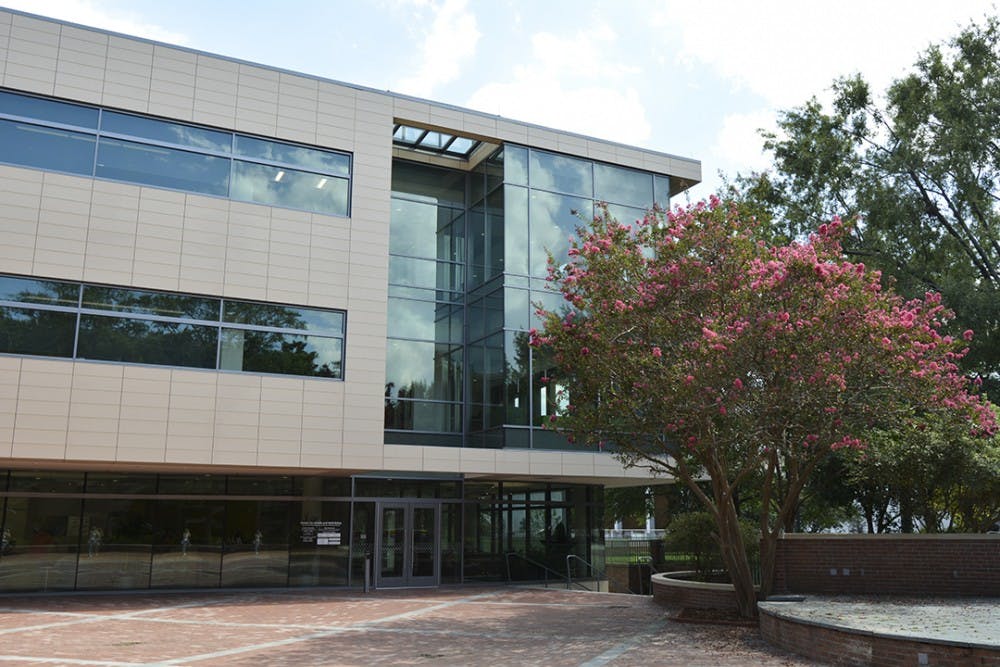Last year, after a graduate student's death, USC students experienced a burst in work towards mental health and wellness awareness on campus. Student Government held its first ever Stigma Free USC week, and Student Health Services began developing new initiatives and projects geared towards mental health.
This year, the second Stigma Free USC week marks the introduction of new resources for students from Student Health Services, such as a 24-hour crisis line, a new podcast where students have the opportunity to share stories about their mental health experiences and a new therapy puppy. The center has also worked on promoting general wellness for students, so they do not only come to the Center for Health and Well-being when they are sick.
“We think about mental health the same way we do as physical health,” said associate director of mental health initiatives April Scott. “What are some things that we could do every day or regularly so that we are maintaining our most optimal health? So that we don’t only think about mental health when something is wrong.”
The counseling center has increased its staff to help accommodate a growing student population and encourages students to come in for anything they need. A staff of 33 faculty members work to ensure that students who come in for triage appointments to seek advice on how to help a friend, personal matters or just to walk in and speak to someone about stress can get any help they may need.
“Students don’t have to wait if they can’t,” said director of counseling and psychiatry Warrenetta Mann. “Students that need to be seen right away can always be seen right away.”
Mann emphasized the impact coming in to see a counselor could have, in not just their immediate problem but on their entire life.
“Your education as a college student is much broader than just what you learn in the classroom. It’s really being prepared to be a contributing member of society, a citizen of the world and learning how to be a good consumer of medical resources, health resources,” Mann said. “For students who may be living with a mental health condition ... it’s really helpful to speak with someone who has some expertise in that area to help you understand how you manage those kinds of things.”
Stigma Free enters second year
Stigma Free USC week is in full swing in its second year for Student Government, and Secretary of Health and Wellness and fourth-year psychology student Katie Cohen put together a full week of events and campaigns to raise awareness for mental health conditions and reduce the stigma of these conditions on campus.
“There is a stigma around mental health and people are afraid to talk about it. People feel like they’re going to be judged, and for that reason they don’t seek the help they need, and that’s a problem,” said Cohen. “Everyone should feel like they can get the help they need without feeling judgement and without feeling like there’s something keeping them from the resources they need.”
The week’s events will center on a theme of body positivity and self-confidence, with actitivies focused on helping students learn how to eat healthy and deal with life’s stresses.
“The purpose is really to kind of teach people how to take care of themselves ... in small ways, and then also to get people to talk about mental health,” Cohen said.
Stigma Free USC week will have its own campaign on social media, showcasing videos everyday where students will share their personal stories and struggles with mental health. They'll also use the hashtag #StigmaFreeUSC to give students not in the videos the opportunity to share their own stories.
“We are trying to show that mental health ... affects everyone, but it affects different groups differently,” Cohen said.
Cohen hopes that this week’s events will get students thinking about mental health, and even have a personal impact on students as they learn more about what these conditions mean.
“Last year when we did this ... someone came up to me and said, ‘I went to counseling because of that week. I realized that I had depression, and I realized that I needed to go to counseling,’” Cohen said.
Gamecock Recovery expands
Originally a student-led initiative, Gamecock Recovery has evolved into an organization and haven for students in recovery seeking community. This year, the university hired a full-time faculty member to help expand the organization and ensure that students in recovery can still achieve academic success and have a fun college experience without alcohol and other drugs.
Larkin Cummings, the new Gamecock Recovery Coordinator, has begun Gamecock Recovery’s first ever celebration of National Recovery Month, and held events for the organization throughout all of September. On Thursday, Sept. 27, the organization will kick off a monthly speaker series on recovery.
“It’s exciting. There’s been a huge amount of support across campus and in the community for Gamecock Recovery, and so that’s exciting. It’s exciting to be able to reach out to students and to work with students,” Cummings said. “I am just really delighted and thrilled to be able to work in such a creative environment and to be able to provide those resources to students.”
Gamecock Recovery holds weekly recovery support meetings and social hours afterward to help create community for its members.
“You come into a room and you find other people who have a similar experience to you, who know what you’re going through,” said substance abuse prevention and education director Aimee Hourigan. “Whether that’s grief over loss, or whether that’s because you’ve got a family member struggling with addiction, or because you’re trying to be a student in recovery and have a true college experience, that opportunity to find other people who get it is just an amazing feeling.”

